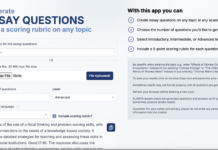
I’ve not been blogging much because I’ve been a bit overwhelmed with work for obvious reasons the last month or so. However, I see the demand for my time flattening a bit – I just hope Covid-19 follows the same pattern.
I did get quite a few calls and emails asking for my advice on what schools, school boards and provincial ministries of education should be doing. I am very reluctant to give advice on this, for several reasons:
- I haven’t worked in the school system since I was a teacher in England in the 1960s.
- I am, as you know, a fervent supporter of online education in post-secondary education, but only in the right context. For many students the campus experience is still very important. I believe its use in the k-12 sector needs to be even more focused and limited. Younger children especially learn better in a social context that involves the physical presence of an adult and other children, and also need to learn how to behave appropriately in social contexts outside the family. They need the security and emotional support of a human teacher. School education is much more than just pure academic learning, and we should never forget that.
- the most important reason: my wife is a former special education teacher; this is her area of expertise and I go there at my peril.
Nevertheless, people are desperate for advice. I was therefore delighted when my wife sent me the following blog posts by Nick Smith,
Smith, N. (2020) How to Salvage BC’s School Year Using Digital Learning The Tyee, 30 March.
Smith, N. (2020) Ten Tips from an Online Educator The Tyee, 1 April
I can’t improve on these articles, although they don’t set out to provide parents with what they need to know. If you are in the k-12 system please read the original articles in full.
The first article discusses:
- the BC government’s Ministry of Education announcements on what happens this term now schools are closed: ‘the message is murky.’
- what it will take for online learning to succeed. Fortunately in British Columbia: ‘All of the academic courses for grades five through 12, as well as scores of electives, have already been developed and are being used in distributed learning programs which run throughout the province….Instead of spending time looking for resources, teachers can invest their efforts in familiarizing themselves with courses that have been developed and curated for each grade level.‘ I am not sure but I believe these are open resources available to other school boards (so long as they can live with the excellent BC school curriculum – now is not a time to be too fussy.)
- myths, challenges and advantages of online learning. This section is essential reading for any Ministry of Education official responsible for policy regarding completing this semester in schools. For instance, Smith concludes that content alone is not enough: Students can work their way through to a certain extent, but as soon as they get stuck, they need a teacher to show them the way forward. Teachers need to know their students: their strengths, weaknesses, attitudes and habits of mind; in order to give them useful feedback.
- getting to the other side: Smith concludes: Best practices in online teaching and learning can be a rope teachers and students can grab to lead us out of this whiteout called COVID-19.
In the second article:
- Nick Smith makes the important distinction between ’emergency remote teaching’ and ‘online learning.’
- ‘What follows is not a distillation of best practices in online education. Think of it more as a helpful survival kit ‘
- these consist of 10 pieces of advice:
- only post essential content
- give clear instructions
- make your assignments ‘ungoogleable’
- use the simplest workable tool
- learn one new skill at a time
- know about fair dealing in the Canadian Copyright Act
- be available when students need you
- dole out feedback incrementally
- use communications tools effectively
- guard student privacy
Well done, Nick. I hope every government official and teacher having to deal with the immense challenge that Covid-19 is posing for schools systems around the world reads these two articles.
Lastly, I hope that policy makers don’t forget the critical role parents can play in supporting their kids learning – but my wife will be blogging about that: www.seedpodkids.com.









 Dr. Tony Bates is the author of eleven books in the field of online learning and distance education. He has provided consulting services specializing in training in the planning and management of online learning and distance education, working with over 40 organizations in 25 countries. Tony is a Research Associate with Contact North | Contact Nord, Ontario’s Distance Education & Training Network.
Dr. Tony Bates is the author of eleven books in the field of online learning and distance education. He has provided consulting services specializing in training in the planning and management of online learning and distance education, working with over 40 organizations in 25 countries. Tony is a Research Associate with Contact North | Contact Nord, Ontario’s Distance Education & Training Network.


Online learning is must in such conditions as we cannot stop learning in this stages